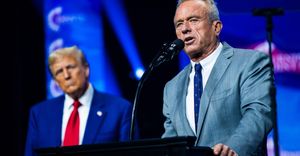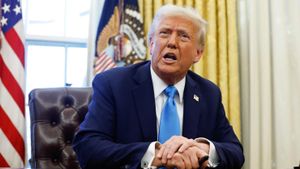Canadian Prime Minister Justin Trudeau raised eyebrows when he articulated concerns over U.S. President Donald Trump's continued rhetoric about annexing Canada, labeling the threats as "a real thing" motivated by U.S. appetite for Canadian natural resources. During remarks made at the Canada-U.S. Economic Summit held on February 3, 2023, Trudeau addressed over 100 business and labor leaders, expressing urgency and worry over the situation.
Initially, Trudeau appeared to rebuff the idea of annexation as mere banter, akin to how many have reacted to Trump’s previous offhand remarks. Yet his statement indicated a shift, recognizing the seriousness of Trump's fixation. "Mr. Trump has it in mind to absorb our country and it is a real thing," he was reported saying, and pointed out U.S. interest stems from Canada’s vast supply of minerals like lithium, nickel, and cobalt—essential for the burgeoning green energy sector.
Trump's comments on making Canada the 51st state have gained traction over the months, with him publicly stating if Canada wishes to avoid tariffs, it might have to give serious consideration to joining the U.S. Trump’s proposed 25% tariffs on imports from Canada would deal a significant blow to the Canadian economy, prompting negotiations for enhanced border security—a key area brought to the forefront due to Trump’s comments on fentanyl trafficking linked to Canada.
Trudeau emphasized, "They’re very aware of our resources, and they very much want to benefit from those," referencing the American knowledge and potential desire to exploit Canada’s riches without fully respecting Canadian sovereignty. It became evident during the summit discussions, with Transport Minister Anita Anand and Labour Minister Steven MacKinnon echoing sentiments about Canada’s independence and decision-making power. MacKinnon stated firmly, "Canada is free. Canada is sovereign. Canada will choose its own destiny, thank you very much."
The summit convened as tensions heightened, initiated by Trump's announcement of tariffs, with Canada temporarily granted reprieve to negotiate its position. Discussions at the summit revealed underlying fears within Canada's political sphere, with the looming potential for fundamental changes in U.S.-Canada relations. The leaders' discussions not only focused on defending against Trump's aggressive economic policies, but also on the broader implication of national pride and identity.
Polling data from January indicated significant Canadian opposition—around 80%—against the idea of becoming part of the United States. Such sentiments highlight how Trump's rhetoric cultivates unease among Canadians, many of whom take pride in their national identity and autonomy. Recent trends show increasing patriotism, particularly as calls for more assertive Canadian responses grow louder within political discourse.
Canadian ministers stressed the importance of unity and cooperation, projecting confidence back to Canadians about their sovereignty under siege. "What I’d like to see is Canada become our 51st state," Trump remarked earlier this week, igniting anxiety and illustrating the unpredictable nature of the current U.S. administration.
For Trudeau, this moment is more than just resisting potential tariffs; it's about safeguarding Canada’s wealth of resources necessary for future energy transitions. The country’s reliance on its resources—critical minerals identified as pivotal for the electric vehicle and renewable energy industries—moulds not just Canada’s economy but also its geopolitical standing.
Trudeau underscored the strategic imperative for Canada to navigate its economic ties with the U.S. from a position of strength. "We need to be very deliberate about how we continue to engage closely with the United States," he stated, amid fears surrounding Trump's intentions.
Even though Trudeau had previously characterized Trump's comments as distractions, he now advocates for strategic development focused on leveraging trade relationships to secure Canada's economy against predatory U.S. policies. The borders and resources remain contentious points, with Canadian officials reaffirming partnerships with global allies as echoed by Industry Minister François-Philippe Champagne, who noted, "Our American friends understand they need Canada for their economic security."
Looking forward, the Canadian government seems poised to adapt its policies and fortify its position on the global stage, striving for internal unity against external threats. With elections on the horizon, the political framing of nationalism becomes pivotal, as the government must cater to the sentiments of Canadians, ensuring actual sovereignty remains unencumbered.
Trudeau's assembly of business leaders serves as evidence of the serious commitment Canada must uphold to maintain its operational autonomy and resources, even amid challenging relations with the U.S. The political climate fosters new conversations on trade, minerals, and the larger picture of Canada’s future, set against the backdrop of Trump’s annexation narrative.



